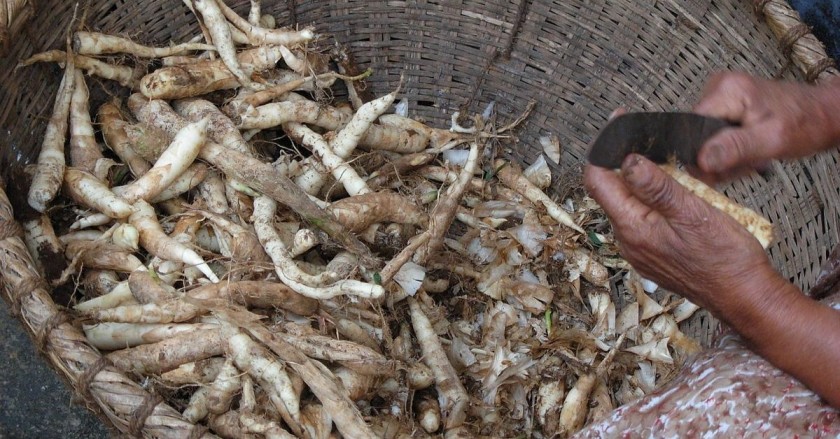Why Grandmas Call Arrowroot the Go-To Superfood For DIgestion, Weight Loss & More
A gluten-free powerhouse, arrowroot has long been advocated for by grandmothers to boost a newborn’s health, improve gut health, help control diabetes, weight loss, and more.

Arrowroot may be native to South America, but Indians have been using it for generations. While the plant is not technically a desi superfood, it has been advocated for by grandmothers to boost a newborn’s health.
Most new Indian parents use arrowroot powder thanks to their strong allegiance to superfoods, but very few are aware of how exactly it helps. Adults can also consume arrowroot for various health related benefits.
Is it A Plant, Root Or Starch?
Technically, arrowroot is not a plant that can be grown by planting seeds. It is a type of starch with high nutrient density that can be processed either in powder form or flour. It can be used in both sweet and savoury dishes.
It is extracted from the cream-coloured rhizomes (an underground stem) of the Marantaceae family of plants. The roots of the plant are washed and dried before extracting the pulp, which is further filtered. The starch then settles at the bottom of the vessel.
The dried form of this starch becomes the powder.
In India, it is usually grown in Uttar Pradesh, West Bengal, Assam, Bihar and Kerala. The ideal time to grow this crop is between the summer months of May and June, and it can be harvested in November or December. It goes by different regional names like Koova in Malayalam, Araruta in Hindi, Ararutkilangu in Tamil and Jukhur in Bengali.
Arrowroot can serve as a healthier alternative to corn or other starches used in items like cakes, pasta and breads. It can also be used to make healthy confectionaries.
It is low in calories but high in carbohydrates, and contains essential nutrients, B vitamins (thiamin and niacin), and minerals like iron, magnesium, phosphorus and zinc.
As Dr Archana Batra, a dietician and certified diabetes educator from Gurugram, tells The Better India, “It is highly nutritious and contains slightly more protein than the other root vegetables. It has calcium, iron, potassium and vitamin B9.”
What Makes Arrowroot A Superfood
One of the major reasons why arrowroot is preferred for babies is that it is gluten-free, which helps in easy digestion.
“It can be a good weaning food. You may add it to rice water or mashed veggies. Arrowroot is also helpful during an infant’s teething troubles. Hard biscuits made of arrowroot can be an ideal and healthy replacement for plastic teethers,” says Dr Batra.
The bioactive compounds in arrowroot such as carbohydrate, amino acids, phenolic compounds, alkaloids and gum helps in controlling cholesterol as well. The copper and iron in arrowroot make red blood cell components healthy, preventing fatigue.
For adults, arrowroot makes for an excellent supplement to improve gut health.
Adults who have celiac disease, a common digestive disorder wherein the gluten can inflame the small intestine, can replace gluten-grains like wheat with arrowroot flour.
“The resistant starch or fiber further helps in regulating bowel movements. Arrowroot powder can also help treat diarrhea in infants. But it is advisable talking to a pediatrician before starting an arrowroot based diet,” Dr Batra adds.
She also notes that arrowroot boosts immunity and aids weight loss due to its low glycemic index (GI). GI has multiple health benefits like reducing blood sugar levels and lowering heart-related ailments.
“Arrowroot has a lot of resistant starch or insoluble fiber that keeps you full for longer and hence is considered good for weight loss. It is considered superior to other tubers for diabetes patients because of its low GI and high protein content,” she says.
Nutritional value of arrowroot (100 grams)
- Calories: 78
- Carbs: 16 grams
- Protein: 5 grams
- Fiber: 2 grams
- Fat: 0 grams
- Folate: 102% of the Daily Value (DV)
- Iron: 15% of the DV
- Phosphorus: 17% of the DV
- Potassium: 11% of the DV
Source: US Department of Agriculture
Edited by Divya Sethu
If you found our stories insightful, informative, or even just enjoyable, we invite you to consider making a voluntary payment to support the work we do at The Better India. Your contribution helps us continue producing quality content that educates, inspires, and drives positive change.
Choose one of the payment options below for your contribution-
By paying for the stories you value, you directly contribute to sustaining our efforts focused on making a difference in the world. Together, let's ensure that impactful stories continue to be told and shared, enriching lives and communities alike.
Thank you for your support. Here are some frequently asked questions you might find helpful to know why you are contributing?


This story made me
-
97
-
121
-
89
-
167














